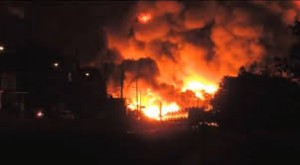 Several people were missing after four tank cars of petroleum products exploded in the middle of a small town in the Canadian province of Quebec early on Saturday in a fiery blast that destroyed dozens of buildings.
Several people were missing after four tank cars of petroleum products exploded in the middle of a small town in the Canadian province of Quebec early on Saturday in a fiery blast that destroyed dozens of buildings.
The disaster occurred shortly after 1 a.m. when a freight train derailed in Lac-Megantic, a picturesque lakeside town of about 6,000 people near the border with Maine. Although police said they could not yet get close enough to determine whether there were any casualties from the still-burning fires, an aerial photograph showed widespread devastation in the town center.
French-language broadcaster Radio-Canada said one building at the center of town was a bar popular with young people. An eyewitness told the broadcaster the town center had been crowded at the time of the derailment.
“Many parents are worried because they haven’t been able to communicate with a member of their family or an acquaintance,” Mayor Colette Roy-Laroche told the channel.
“We can’t give out any information on what’s happening right now because the firemen haven’t been able to get close.”
The Canadian Broadcasting Corp. said four pressurized tank cars blew up after the train, which had 73 cars in all, came off the rails. Pictures taken in the moments after the disaster showed a gigantic fireball rising high into the night sky. Residents told reporters they had heard five or six large blasts.
Nearly 10 hours after the derailment, one rail car was still burning.
Fire officials said they feared more of the tanker cars were at risk of exploding. Around 30 buildings in the town center were destroyed, some by the initial blast and others by the subsequent fire, they said.
Police imposed a 1/2-mile (1-km) security zone around the blast and evacuated about 1,000 people from their homes.
“When you see the center of your town almost destroyed, you’ll understand that we’re asking ourselves how we are going to get through this event,” a tearful Roy-Laroche told a televised news briefing.
Prime Minister Stephen Harper made an initial statement via Twitter: “Thoughts & prayers are with those impacted in Lac Megantic. Horrible news.”
Lac-Megantic is part of Quebec’s Eastern Townships region, an area popular with tourists that is close to the border with Maine and Vermont. Quebec is a predominantly French-speaking province in the eastern half of Canada.
Huge clouds of thick black smoke were still rising from the center of Lac-Megantic several hours after the disaster.
Fire officials said they had asked for help from fire services in the United States. Around 20 fire engines were fighting the blaze.
Police said some cars had spilled their contents into the river that runs through the town.
“I can say absolutely nothing about victims… We’ve been told about people who are not answering their phones, but you have to understand that there are people who are out of town and on holiday,” police spokesman Michel Brunet told the briefing.
The rail line is operated by Montreal, Maine & Atlantic, which owns some 510 miles of track in Maine and Vermont in the United States and in Quebec and New Brunswick in Canada.
Fire officials said the contents of the tanker cars that blew up had been pressurized.
“There are still wagons which we think are pressurized. We’re not sure because we can’t get close, so we’re working on the assumption that all the cars were pressurized and could explode. That’s why progress is slow and tough,” said local fire chief Denis Lauzon.
Satellite images show the railroad snaking through downtown, following a route parallel to the shore of the lake that the town is named after, before heading inland and crossing the U.S. border to the west of town.
There have been a number of high-profile derailments of trains carrying petroleum products in Canada recently, including one in Calgary, Alberta, last week when a flood-damaged bridge sagged toward the still-swollen Bow River. The derailed rail cars were removed without spilling their cargo.
Reuters

Leave a Reply
You must be logged in to post a comment.